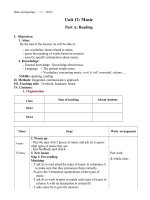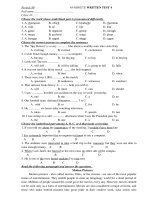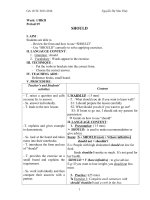GIÁO ÁN TIẾNG ANH LỚP 10 bam sat 10 11
Bạn đang xem bản rút gọn của tài liệu. Xem và tải ngay bản đầy đủ của tài liệu tại đây (83.6 KB, 3 trang )
Self-chosen - English 10
Date:…….../…………/……….
Period: 11
PASSIVE VOICE
THE SIMPLE FUTURE AND MODAL VERBS
I. AIM :
Students are able to
- Review the passive voice with modal verbs and the simple present tense.
- Use these structures correctly to solve applying exercises.
II. LANGAUGE CONTENT :
1. Grammar : Passive voice with modals verbs and the simple future tense.
2. Vocabulary : Words appear in the exercise.
III. PROCEDURE :
Teacher’s and Students’
activities
Content
- T. asks Ss. to list some modal
verbs that they know.
- Ss. give their answers.
- T. introduces the new lesson.
I. WARM UP : ( 2 mns)
-T. : List some modal verbs that you know.
Modal verbs : can, could, should, may, might, must, have to,
ought to, will, shall,
- T. shows a picture of a girl who
is cleaning the floor and makes
examples.
- T. has Ss. change these
examples into passive voice.
- Ss. speak out their sentences.
II. LANGUAGE CONTENT :
1. Presentation: ( 17 mns)
THE SIMPLE FUTURE :
Active : Jane
will clean the floor tomorrow .
S
V
O
Passive : The floor will be cleaned by Jane tomorrow.
S + will/ shall / be going to + V (bare inf) + O
S + will / shall / be going to + BE + Vpp + (by O)
MODAL VERBS: can, could, may, might, should, must, have to,
ought to
Active : Jane must clean the floor now .
Passive : The floor must be cleaned by Jane now.
S + MODAL + V (bare inf) + O
- T. checks with the whole class.
- Then, T. asks Ss. to draw out
the structures.
- Ss. form the structures and write
S + MODAL + BE + VPP + (BY O)
them on the board.
Note:
- T. notices Ss. about the position
- The position of by + O in the passive sentence : before adverb
of by + O in the passive of time and after adverb of place.
sentences.
E.g : George might be sent to America by his company in August
- T. introduces the past form of
- The past form of Modal verbs
modal verbs.
S + MODAL + HAVE + Vpp + O
- T. gives illustrating examples to
help Ss. make clear.
S + MODAL + HAVE BEEN + Vpp + (BY O)
- Ss. listen to T.’s presentation, E.g: Somebody should have cleaned the windows yesterday
look at the screen and take notes
The windows should have been cleaned yesterday.
into their notebooks.
2. Practice : (25 mns)
Teacher : Nguyeãn Thò Thu Thuûy
- T. shows the exercise on a small
board
and
explains
the
requirement and new words if
any.
- Ss. work individually, then
compare their answers with a
partner.
- T. calls on some Ss. to give their
answers aloud and explain their
choices.
- Ss. give their answers.
- Then, T. checks with the whole
class.
- T. explains the requirement of
the exercise.
- Ss. copy into their notebooks
- T. has Ss. work in pairs to do
the exercise.
- T. goes around the class to offer
help.
- After finishing, T. calls on some
Ss. to go to the board and write
their answers.
- Ss. go to the board and present
their answers.
- T. has other Ss. give comments
and corrective feedback.
- T. checks with the whole class.
Self-chosen - English 10
Exercise 1: Underline the correct form active or passive of the
verbs in brackets.
1. You (mustn’t be overcome / mustn’t overcome) by difficulties if
you want to succeed in life.
2. A party (may be given / may give) this weekend.
3. Nothing (can’t be hear / can be heard) because of noisy
surroundings.
4. Nobody (could be received / could receive) the gold medal.
5. You (must be feeling / must be felt) very happy because you’ve
passed you final exam with satisfying marks.
Answers :
1. mustn’t be overcome
2. may be given
3. can be heard
4. could receive
5. must be feeling
Exercise 2: Change the sentences into passive voice.
1. You can’t make tea with cold water.
2. They may use this room for the classroom.
3. You must clean the floor before you paint it.
4. The teacher is going to tell a story.
5. They will hold the meeting before May Day.
6. You mustn’t use this machine after 5.30
7. We can never find him at home for he is always on the movie.
8. The students are going to make a two-day picnic to Thay pagoda.
9. Someone might have stolen your car if you left the key in it.
10. They shouldn’t have played the football match in such bad
weather.
Answers:
1. Tea can’t be made with cold water.
2. This room may be used for the classroom.
3. The floor must be cleaned before it is painted.
4. A story is going to be told by the teacher.
5. The meeting will be hold before May Day.
6. This machine mustn’t be used after 5.30.
7. He can never be found at home for he is always on the movie.
8. A two-day trip to Thay pagoda is going to made by the students.
9. Your car might have been stolen if you left the key in it.
10. The football match shouldn’t have been played in such bad
weather.
III. HOMEWORK : (1 mn)
-Ss. review the passive voice with modal verbs and the simple
future tense and make 5 sentences, using these structures.
Self-evaluation :
………………………………………………………………………………………………………………………………………………………………………………………………………
………………………………………………………………………………………………………………………………………………………………………………………………………
Teacher : Nguyeãn Thò Thu Thuûy
Self-chosen - English 10
………………………………………………………………………………………………………………………………………………………………………………………………………
………………………………………………………………………………………………………………………………………………………………………………………………………
………………………………………………………………………………………………………………………………………………………………………………………………………
Teacher : Nguyeãn Thò Thu Thuûy









